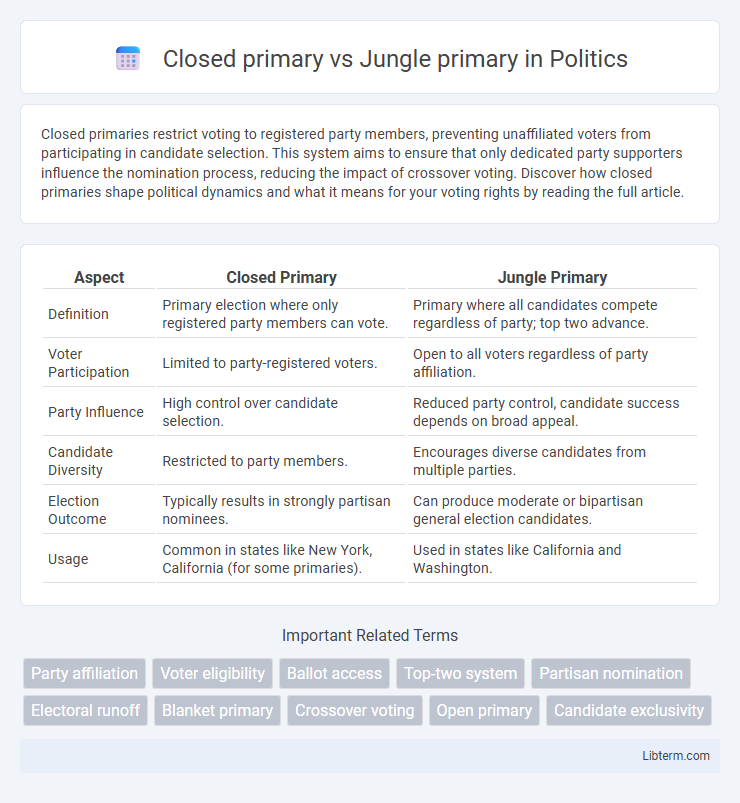Closed primaries restrict voting to registered party members, preventing unaffiliated voters from participating in candidate selection. This system aims to ensure that only dedicated party supporters influence the nomination process, reducing the impact of crossover voting. Discover how closed primaries shape political dynamics and what it means for your voting rights by reading the full article.
Table of Comparison
| Aspect | Closed Primary | Jungle Primary |
|---|---|---|
| Definition | Primary election where only registered party members can vote. | Primary where all candidates compete regardless of party; top two advance. |
| Voter Participation | Limited to party-registered voters. | Open to all voters regardless of party affiliation. |
| Party Influence | High control over candidate selection. | Reduced party control, candidate success depends on broad appeal. |
| Candidate Diversity | Restricted to party members. | Encourages diverse candidates from multiple parties. |
| Election Outcome | Typically results in strongly partisan nominees. | Can produce moderate or bipartisan general election candidates. |
| Usage | Common in states like New York, California (for some primaries). | Used in states like California and Washington. |
Introduction to Primary Election Systems
Closed primary election systems restrict voting to registered party members, ensuring nominees represent their party's core values, while jungle primary systems allow all candidates, regardless of party affiliation, to compete on a single ballot with all voters participating. In jungle primaries, the top two vote-getters advance to the general election, which can result in two candidates from the same party competing. These primary structures significantly impact voter participation, candidate strategy, and party influence in the nomination process.
What is a Closed Primary?
A closed primary is an election system where only registered party members can vote to select their party's candidate for the general election, ensuring that only affiliated voters influence the candidate nomination process. This method helps maintain party integrity by preventing voters from other parties from affecting the selection of nominees. Closed primaries are commonly used in states like New York and Florida to secure a more ideologically aligned candidate for the general election.
How Does a Jungle Primary Work?
A jungle primary allows all candidates from all parties to compete in a single primary election, where voters can select any candidate regardless of party affiliation. The top two vote-getters then advance to the general election, even if both are from the same party, ensuring broader voter choice. This system contrasts with closed primaries, which restrict voting to registered party members only.
Key Differences Between Closed and Jungle Primaries
Closed primaries restrict voting to registered party members only, ensuring that only Democrats vote in Democratic primaries and Republicans in Republican primaries, while jungle primaries allow all candidates, regardless of party, to compete on the same ballot with all voters able to participate. In closed primaries, party loyalty is emphasized, often excluding independents, whereas jungle primaries promote broader voter inclusivity but can dilute party influence. The winner in a jungle primary is either the candidate with over 50% of votes or the top two candidates who then proceed to a runoff, contrasting with closed primaries where the candidate with the most party votes typically wins outright.
Advantages of Closed Primaries
Closed primaries restrict voting to registered party members, ensuring candidates represent core party values and loyal constituents. This system reduces the risk of crossover voting, which can distort candidate selection and strategic party positioning. Voters tend to be more informed about party-specific issues, leading to stronger party cohesion and clearer electoral mandates.
Benefits of Jungle Primaries
Jungle primaries allow all candidates, regardless of party affiliation, to compete in a single primary, increasing voter choice and promoting more moderate candidates who appeal to a broader electorate. This system can reduce extreme partisanship by encouraging candidates to seek votes beyond their base, enhancing overall representative effectiveness. Voters are empowered to select their preferred candidate without party restrictions, leading to higher voter engagement and turnout.
Voter Participation and Accessibility
Closed primaries restrict voting to registered party members, limiting voter participation and reducing accessibility for unaffiliated or independent voters. Jungle primaries allow all candidates to compete regardless of party and enable all registered voters to participate, significantly increasing voter engagement and access. This open format promotes broader representation but may dilute party influence in the nomination process.
Impact on Political Parties
Closed primaries limit participation to registered party members, strengthening party control over candidate selection and reducing the influence of independent voters. Jungle primaries allow all candidates to compete regardless of party affiliation, often leading to cross-party competition that can weaken traditional party structures and encourage moderate or non-traditional candidates. This system impacts political parties by diminishing their gatekeeping power and potentially altering party unity and electoral strategies.
Influence on Election Outcomes
Closed primaries restrict voting to registered party members, which often results in candidates who strongly represent the party's core values and can lead to more ideologically polarized election outcomes. Jungle primaries allow all candidates, regardless of party, to compete in a single election, increasing the likelihood of moderate or consensus candidates advancing and potentially producing more centrist general election results. This system can diminish the influence of party extremes and encourage broader voter participation in the candidate selection process.
Conclusion: Choosing the Right Primary System
Closed primaries limit voting to registered party members, enhancing party cohesion and ideological consistency, while jungle primaries allow all candidates to compete regardless of party, increasing voter choice and potentially reducing partisanship. The ideal primary system depends on priorities like party control, voter inclusivity, and electoral competitiveness. States must balance these factors to select a primary system that aligns with their democratic goals and political culture.
Closed primary Infographic

 libterm.com
libterm.com